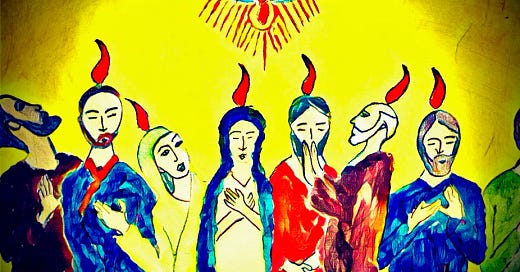The Good News of Pentecost is the Gospel Itself
The Holy Spirit frees people to speak promises only God can promise
One of my first teachers of theology, Eugene Rogers, contends, counterintuitively in our culture:
"To think about the Spirit it will not do to think spiritually: to think about the Spirit you have to think materially…The Holy Spirit, who in classical Christian discourse "pours out on all flesh," has tended in modern theology and worship to float free of bodies.”
Indeed the proper starting point for understanding the Christian experience of and teaching about the Holy Spirit is Luke’s account of the Spirit’s outpouring forty days post Easter. Pentecost is likewise the necessary passage to understand how the Spirit’s work upon the Son’s disciples accords with the Spirit’s material effects throughout Israel’s scriptures.
In Acts, the Spirit’s work is not in the slightest spiritual.
The point in Luke’s reporting of Pentecost is not the arresting imagery of rushing wind and tongues of flame nor is it the linguistic miracle of so much confused speech nevertheless yielding understanding, an undoing of Babel. It’s straightforwardly clear in the text: the point of Luke’s Pentecost account is the biblical interpretation— the proclamation— the Spirit sets free.
Biblically, the Spirit moves in the world to effect material ends.
For example:
In Exodus, Yahweh’s ruach blasts the armies of Pharaoh and drives back the waters of the Red Sea.
In Isaiah, Yahweh’s ruach dispatches Yahweh’s people to exile.
In Judges, Yahweh’s ruach falls upon Othniel; so that, he will set forth and war.
The self same Spirit empowers Moses to fulfill his role in the deliverance of God’s people from bondage in Egypt. When circumstances force Moses to delegate his responsibilities and share some of his Spirit with others, the immediate effect, Numbers 11 says, is that those upon Moses’s spirit rested began to utter prophecy.
In Israel’s Bible, the Spirit always moves in the world to effect material ends.
Prophecy, politics, and the leadership of God’s people— utterances that give life and wield judgment— are all inextricable works of God’s Spirit in the Old Testament. This is most evident in scripture’s record of Saul and David where charismatic experience (think: David dancing naked before the ark) and prophecy and political action are inseparable items of a single work of Yahweh’s ruach.
Consequently, a reader of Israel’s scriptures should notice that at Pentecost the Father and the Son in their Spirit alight not upon a solitary prophet but upon a whole gathering of people.
The disciples all become as David.
The gathering itself is like Gideon.
The church is now the prophet whose proclamation kills and makes alive.
At Pentecost, the Spirit pours Herself not upon a lone judge or a particular prophet or single king but upon the whole gaggle called church which, simultaneously, She has just created. Just so, the disciples of the Lord Jesus— Jews all— understood Pentecost as the fulfillment of a fundamental motif of their Bible: the coming of ruach Yahweh to make prophets, raise up judges, and elect kings.
Keep reading with a 7-day free trial
Subscribe to Tamed Cynic to keep reading this post and get 7 days of free access to the full post archives.




